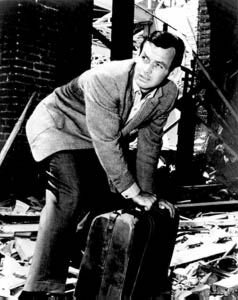You are hereMagazines 1990-1999 / Television Shows / The Fugitive
The Fugitive
 David Janssen
David Janssen
A MODERN MORALITY TALE
By TOM SOTER
from VIDEO, October 1991
The Fugitive Collectors Anthology
1991 Compilation. Volume 1: "The Girl from Little Egypt" (1965). David Janssen, Barry Morse, Ed Nelson, Pamela Tiffin, Diane Brewster; dir. Vincent McEveety/"The End Is But the Beginning" (1965). Janssen, Morse, Barbara Barrie, Andrew Duggan; dir. Walter Grauman. 104 min. Ten tapes with two episodes each, available through mail order (1-800-333-0113). $24.95 each. Nu Ventures Video Library, 7930 Alabama Avenue, Canoga Park, CA 91304.
Call it a Christian Crime Drama, but don't call The Fugitive a flop. Twenty-nine years ago, Dr. Richard Kimble began running. And when he stopped, on August 29, 1967, the largest TV audience in the world watched him prove his innocence by confronting the man who had killed his wife.
A huge success in its initial "run" (excuse the pun), The Fugitive followed the adventures of Dr. Kimble (David Janssen) as he criss-crossed the country searching for the One-Armed Man who
could clear him. It inspired a slew of imitations ( The Invaders, Run for Your Life, The Incredible Hulk) and homages (frequent references were made to it on Twin Peaks, but no equal. And no wonder. It was an odd combination of morality and melodrama, cleverly dressed up as an action series.
"The Girl from Little Egypt" sets the pattern for the 119 other episodes: Kimble accidentally gets involved in a sordid drama of infidelity but manages to set a young girl on the right path before fleeing the police. Although thin by Fugitive standards, it does contain footage – via flashbacks – from the series' unaired pilot, showing how the Kimbles fought, wife Helen died, and the doctor began running. "The End Is But the Beginning," from the second season, explores Lt. Philip Gerard's (Barry Morse) obsession with catching Kimble in a storyline that finds the Fugitive trying to convince the detective he was killed in a truck wreck.
Based on Victor Hugo's Les Miserables and the real-life case of falsely accused Dr. Sam Sheppard, The Fugitive succeeds not because of its improbable premise, but because of its acting, writing, and underlying message of hope. The series is a fable of redemption through suffering: in spite of the abuse he receives, despite an uncaring system attempting to crush him, Kimble always returns love for hate, concern for callousness, truth for lies. In a world of "Me Firstism," deceit, hopelessness, and despair, The Fugitive's message is endlessly appealing. It is a modern morality tale – and fun, to boot.
